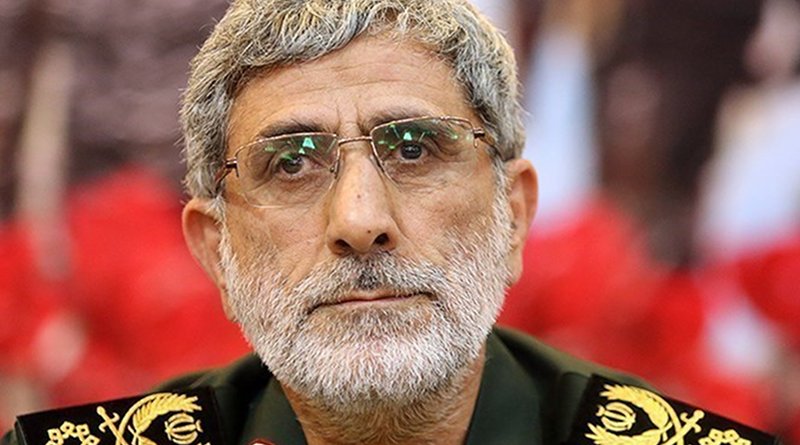Iran: Qaani Will Employ Same Brutal Tactics As Soleimani – OpEd
By Arab News
By Dr. Majid Rafizadeh*
Qassem Soleimani’s death has undoubtedly created fear among Iran’s proxies and terror groups. As a result, Supreme Leader Ali Khamenei appointed Brig. Gen. Esmail Qaani as the new head of the Quds Force less than 12 hours after Soleimani was killed in a US airstrike ordered by President Donald Trump. This was an attempt to send a signal to Iran’s proxies, particularly Hezbollah, the Houthis and Iraqi militia groups, that the status quo — Tehran’s mission and support for them — will persist without any interruption. As Khamenei emphasized, the program of the Quds Force, the elite paramilitary branch of Iran’s Islamic Revolutionary Guard Corps (IRGC), “will be unchanged from the time of (Qaani’s) predecessor.”
Khamenei’s swift move was also likely aimed at uniting the Quds Force under a new leadership in order to assuage the fears and concerns of the Iranian forces, who were shocked by the unexpected death of their top general. The supreme leader applauded the new commander for his past achievements and characterized him as “one of the most distinguished Revolutionary Guard commanders.”
In an authoritarian military institution such as the Quds Force, the character of the commander is critical. Qaani will report directly to Khamenei and will play a significant role in making final decisions concerning Iran’s foreign policy and its role in other countries.
Although relatively little has been written about the new commander of the Quds Force when compared to his predecessor, an examination of his background and military career reveals some similarities and some differences between Qaani and the slain Soleimani.
One of the most important differences is the fact that Qaani lacks his predecessor’s charismatic personality. Among Iran’s hard-liners and Khamenei’s conservative base, Soleimani was considered a national hero and was even more popular than President Hassan Rouhani. Qaani also most likely lacks the deep personal connections that Soleimani had developed with the leaders of many terror groups across the region over the past four decades.
Nevertheless, the new commander of the Quds Force has several critical commonalities with Soleimani. Although Soleimani and other politicians — including his predecessor Brig. Gen. Ahmad Vahidi and late former President Akbar Hashemi Rafsanjani — had several disagreements over military strategy, particularly during the Iran-Iraq War, Qaani and Soleimani developed a cordial relationship and were considered to be on the same page with regard to military tactics and advancing Iran’s hegemonic ambitions.
Like Soleimani, Qaani is a hard-liner who backs the regime’s revolutionary ideals. This means that he does not believe the Islamic Republic’s revolutionary principles are limited to Iran’s boundaries, but instead must be exported to other nations. More importantly, in order to increase Iran’s influence in the region and export the regime’s fundamentalist ideals, Qaani prioritizes resorting to hard power, asymmetrical warfare, sponsoring terror groups and pursuing military adventurism in the region, rather than employing soft power and diplomatic initiatives.
For instance, with respect to the Syrian war, Qaani repeatedly advocated for deploying Iran’s military might to impose the will of the Islamic Republic. He viewed maintaining the power of the Alawite state as a matter of national security for Iran. He was reported as saying: “In the current year, destiny only determines the result of this civil war in Syria. This war requires commanders who can impose the will of the Iranian regime (on its) enemies.”
Qaani is also known for overseeing the Quds Force’s financial disbursements and weapons shipments to Iran’s proxies and terrorist groups. According to a report by a UN Panel of Experts, one shipment that was seized in Nigeria en route to The Gambia included 240 tons of ammunition — including rockets, mortar shells and grenades.
To carry out this work, Qaani used IRGC front companies such as Behineh Trading, according to the US Department of the Treasury. This is why the new Quds Force commander was added to the Treasury’s Specially Designated Nationals (SDN) list, meaning his US-held assets were frozen and he was prohibited from dealing with US entities.
Although Qaani lacks Soleimani’s charisma, he will most likely employ the same brutal and violent tactics as his predecessor. He is a hard-line revolutionary who will attempt to advance the regime’s mission of fomenting unrest in other nations, sponsoring terror groups, and ensuring the hold on power of the supreme leader.
• Dr. Majid Rafizadeh is a Harvard-educated Iranian-American political scientist. He is a leading expert on Iran and US foreign policy, a businessman and president of the International American Council. He serves on the boards of the Harvard International Review, the Harvard International Relations Council and the US-Middle East Chamber for Commerce and Business. Twitter: @Dr_Rafizadeh

